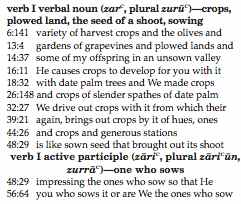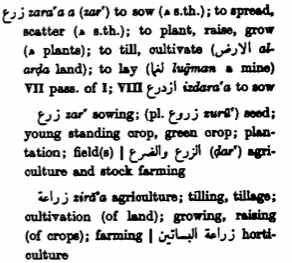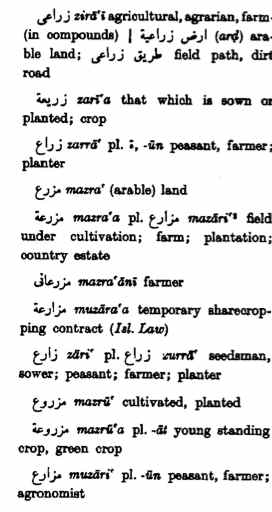
Help keep us
online.
Donate today
Click here:
Thank you!
Zay-Ra-Ayn
To sow seed, cast seed, till the ground, cause [the plants, children] to grow, give increase to, he who sows, reaps, what is raised by means of sowing, seed-produce, what is sown. (Zay Ra Waw 'Ayn = offspring, children, a child)
Tazra'uuna
(imp. 2nd. p.m. plu)
You shall sow, cultivate
Zar'un
(n.)
Cornfield
Zuruu'un
(n. plu.)
Cornfields
Zurraa'un
(n. plu)
Sowers.
Zaari'uuna
(act.pic. m. plu.)
Growers; Causers of the growth.
tazraAAoona
You shall sow, cultivate
12:47
قَالَ تَزْرَعُونَ سَبْعَ سِنِينَ دَأَبا ً فَمَا حَصَدْتُمْ فَذَرُوه ُُ فِي سُنْبُلِهِ~ِ إِلاَّ قَلِيلا ً مِمَّا تَأْكُلُونَ
Qāla Tazra`ūna Sab`a Sinīna Da'abāan Famā Ĥaşadtum Fadharūhu Fī Sunbulihi 'Illā Qalīlāan Mimmā Ta'kulūna
He said: "You will plant regularly for seven years, and whatever you harvest you must leave it in its pods, except for the little that you will eat."
56:64
أَأَنْتُمْ تَزْرَعُونَهُ~ُ أَمْ نَحْنُ الزَّارِعُونَ
'A'antum Tazra`ūnahu 'Am Naĥnu Az-Zāri`ūna
Did you grow them, or were We the Ones who grew them?
wazarAAun
Sowers
13:4
وَفِي الأَرْضِ قِطَع ٌ مُتَجَاوِرَات ٌ وَجَنَّات ٌ مِنْ أَعْنَاب ٍ وَزَرْع ٌ وَنَخِيل ٌ صِنْوَان ٌ وَغَيْرُ صِنْوَان ٍ يُسْقَى بِمَاء ٍ وَاحِد ٍ وَنُفَضِّلُ بَعْضَهَا عَلَى بَعْض ٍ فِي الأُكُلِ إِنَّ فِي ذَلِكَ لَآيَات ٍ لِقَوْم ٍ يَعْقِلُونَ
Wa Fī Al-'ArĐi Qiţa`un Mutajāwirātun Wa Jannātun Min 'A`nābin Wa Zar`un Wa Nakhīlun Şinwānun Wa Ghayru Şinwānin Yusqá Bimā'in Wāĥidin Wa NufaĐĐilu Ba`Đahā `Alá Ba`Đin Fī Al-'Ukuli 'Inna Fī Dhālika La'āyātin Liqawmin Ya`qilūna
And on the earth are neighboring pieces of land with gardens of grapes and plants and palm trees, some of which may be twin sharing the same root, or single, even though they are being watered with the same water source; and We make preference for some of them over others in what they consume. In that are signs for a people who comprehend.
alzzariAAoona
{Plural is zurra 'un]
The grower, the causer of the growth
56:64
أَأَنْتُمْ تَزْرَعُونَهُ~ُ أَمْ نَحْنُ الزَّارِعُونَ
'A'antum Tazra`ūnahu 'Am Naĥnu Az-Zāri`ūna
Did you grow them, or were We the Ones who grew them?
zarAAan
(N)
Seed, corn, corn-field, land sown with corn, cultable land, plant
18:32
وَاضْرِبْ لَهُمْ مَثَلا ً رَجُلَيْنِ جَعَلْنَا لِأحَدِهِمَا جَنَّتَيْنِ مِنْ أَعْنَاب ٍ وَحَفَفْنَاهُمَا بِنَخْل ٍ وَجَعَلْنَا بَيْنَهُمَا زَرْعا ً
Wa AĐrib Lahum Mathalāan Rajulayni Ja`alnā Li'ĥadihimā Jannatayni Min 'A`nābin Wa Ĥafafnāhumā Binakhlin Wa Ja`alnā Baynahumā Zar`āan
And give them the example of two men: We made for one of them two gardens of grapes, and We surrounded them with palm trees, and We made crops in their midst.
32:27
أَوَلَمْ يَرَوْا أَنَّا نَسُوقُ الْمَاءَ إِلَى الأَرْضِ الْجُرُزِ فَنُخْرِجُ بِه ِِ زَرْعا ً تَأْكُلُ مِنْهُ أَنْعَامُهُمْ وَأَنفُسُهُمْ أَفَلاَ يُبْصِرُونَ
'Awalam Yaraw 'Annā Nasūqu Al-Mā'a 'Ilá Al-'ArĐi Al-Juruzi Fanukhriju Bihi Zar`āan Ta'kulu Minhu 'An`āmuhum Wa 'Anfusuhum 'Afalā Yubşirūna
Have they not seen that We drive the water to the barren lands, and produce with it crops to feed their livestock, and themselves? Do they not see?
39:21
أَلَمْ تَرَى أَنَّ اللَّهَ أَنْزَلَ مِنَ السَّمَاءِ مَاء ً فَسَلَكَه ُُ يَنَابِيعَ فِي الأَرْضِ ثُمَّ يُخْرِجُ بِه ِِ زَرْعا ً مُخْتَلِفاً أَلْوَانُه ُُ ثُمَّ يَهِيجُ فَتَرَاه ُُ مُصْفَرّا ً ثُمَّ يَجْعَلُه ُُ حُطَاما ً إِنَّ فِي ذَلِكَ لَذِكْرَى لِأوْلِي الأَلْبَابِ
'Alam Tará 'Anna Allāha 'Anzala Mina As-Samā'i Mā'an Fasalakahu Yanābī`a Fī Al-'ArĐi Thumma Yukhriju Bihi Zar`āan Mukhtalifāan 'Alwānuhu Thumma Yahīju Fatarāhu Muşfarrāan Thumma Yaj`aluhu Ĥuţāmāan 'Inna Fī Dhālika Ladhikrá Li'wlī Al-'Albābi
Do you not see that God sends down water from the sky, then lets it run as springs in the earth, then He produces with it plants of various colors, then they grow until they turn yellow, then He makes them dry and broken? In this is a reminder for those who possess intelligence.
wazurooAAin
(N)
(and) Corn-fields
26:148
وَزُرُوع ٍ وَنَخْل ٍ طَلْعُهَا هَضِيم ٌ
Wa Zurū`in Wa Nakhlin Ţal`uhā HaĐīmun
"And green crops and palm trees laden with fruit."
44:26
وَزُرُوع ٍ وَمَقَام ٍ كَرِيم ٍ
Wa Zurū`in Wa Maqāmin Karīmin
And crops and an honorable station?
alzzarAAa
6:141
وَهُوَ الَّذِي أَنْشَأَ جَنَّات ٍ مَعْرُوشَات ٍ وَغَيْرَ مَعْرُوشَات ٍ وَالنَّخْلَ وَالزَّرْعَ مُخْتَلِفاً أُكُلُه ُُ وَالزَّيْتُونَ وَالرُّمَّانَ مُتَشَابِها ً وَغَيْرَ مُتَشَابِه ٍ ٍ كُلُوا مِنْ ثَمَرِهِ~ِ إِذَا أَثْمَرَ وَآتُوا حَقَّه ُُ يَوْمَ حَصَادِه ِِ وَلاَ تُسْرِفُوا إِنَّهُ لاَ يُحِبُّ الْمُسْرِفِينَ
Wa Huwa Al-Ladhī 'Ansha'a Jannātin Ma`rūshātin Wa Ghayra Ma`rūshātin Wa An-Nakhla Wa Az-Zar`a Mukhtalifāan 'Ukuluhu Wa Az-Zaytūna Wa Ar-Rummāna Mutashābihāan Wa Ghayra Mutashābihin Kulū Min Thamarihi 'Idhā 'Athmara Wa 'Ātū Ĥaqqahu Yawma Ĥaşādihi Wa Lā Tusrifū 'Innahu Lā Yuĥibbu Al-Musrifīna
And He is the One Who initiated gardens; both trellised and untrellised; and palm trees, and plants, all with different taste; and olives and pomegranates, similar and not similar. Eat from its fruit when it blossoms and give its due on the day of harvest; and do not waste. He does not like the wasteful.
zarAAin
(this is the root word)
14:37
رَبَّنَا إِنِّي أَسْكَنتُ مِنْ ذُرِّيَّتِي بِوَادٍ غَيْرِ ذِي زَرْعٍ عِنْدَ بَيْتِكَ الْمُحَرَّمِ رَبَّنَا لِيُقِيمُوا الصَّلاَةَ فَاجْعَلْ أَفْئِدَة ً مِنَ النَّاسِ تَهْوِي إِلَيْهِمْ وَارْزُقْهُمْ مِنَ الثَّمَرَاتِ لَعَلَّهُمْ يَشْكُرُونَ
Rabbanā 'Innī 'Askantu Min Dhurrīyatī Biwādin Ghayri Dhī Zar`in `Inda Baytika Al-Muĥarrami Rabbanā Liyuqīmū Aş-Şalāata Fāj`al 'Af'idatan Mina An-Nāsi Tahwī 'Ilayhim Wa Arzuqhum Mina Ath-Thamarāti La`allahum Yashkurūna
"Our Lord, I have resided some from my progeny in a valley with no vegetation, near your Restricted Sanctuary. My Lord, so that they may hold the contact prayer. So let the hearts of the people incline towards them and give provisions to them of the fruits that they may give thanks."
alzzarAAa
corn
16:11
يُنْبِتُ لَكُمْ بِهِ الزَّرْعَ وَالزَّيْتُونَ وَالنَّخِيلَ وَالأَعْنَابَ وَمِنْ كُلِّ الثَّمَرَاتِ إِنَّ فِي ذَلِكَ لَآيَة ً لِقَوْم ٍ يَتَفَكَّرُونَ
Yunbitu Lakum Bihi Az-Zar`a Wa Az-Zaytūna Wa An-Nakhīla Wa Al-'A`nāba Wa Min Kulli Ath-Thamarāti 'Inna Fī Dhālika La'āyatan Liqawmin Yatafakkarūna
He brings forth with it the vegetation and the olives and the palm trees and the grapes, and of all the fruits; in that are signs for a people who think.
alzzurra
The sowers
48:29
مُحَمَّد ٌ رَسُولُ اللَّهِ وَالَّذِينَ مَعَهُ~ُ أَشِدَّاءُ عَلَى الْكُفَّارِ رُحَمَاءُ بَيْنَهُمْ تَرَاهُمْ رُكَّعا ً سُجَّدا ً يَبْتَغُونَ فَضْلا ً مِنَ اللَّهِ وَرِضْوَانا ً سِيمَاهُمْ فِي وُجُوهِهِمْ مِنْ أَثَرِ السُّجُودِ ذَلِكَ مَثَلُهُمْ فِي التَّوْرَاةِ وَمَثَلُهُمْ فِي الإِنجِيلِ كَزَرْعٍ أَخْرَجَ شَطْأَه ُُ فَآزَرَه ُُ فَاسْتَغْلَظَ فَاسْتَوَى عَلَى سُوقِه ِِ يُعْجِبُ الزُّرَّاعَ لِيَغِيظَ بِهِمُ الْكُفَّارَ وَعَدَ اللَّهُ الَّذِينَ آمَنُوا وَعَمِلُوا الصَّالِحَاتِ مِنْهُمْ مَغْفِرَة ً وَأَجْراً عَظِيما ً
Muĥammadun Rasūlu Allāhi Wa Al-Ladhīna Ma`ahu 'Ashiddā'u `Alá Al-Kuffāri Ruĥamā'u Baynahum Tarāhum Rukka`āan Sujjadāan Yabtaghūna FaĐlāan Mina Allāhi Wa RiĐwānāan Sīmāhum Fī Wujūhihim Min 'Athari As-Sujūdi Dhālika Mathaluhum Fī At-Tawrāati Wa Mathaluhum Fī Al-'Injīli Kazar`in 'Akhraja Shaţ'ahu Fa'āzarahu Fāstaghlaža Fāstawá `Alá Sūqihi Yu`jibu Az-Zurrā`a Liyaghīža Bihimu Al-Kuffāra Wa`ada Allāhu Al-Ladhīna 'Āmanū Wa `Amilū Aş-Şāliĥāti Minhum Maghfiratan Wa 'Ajrāan `Ažīmāan
Mohammed is the messenger of God, and those who are with him are severe against the rejecters, but merciful between themselves. You see them kneeling and prostrating, they seek the blessings and approval of God. Their distinction is in their faces, as a result of prostrating. Such is their example in the Torah. And their example in the Gospel is like a plant which shoots out and becomes strong and thick and it stands straight on its trunk, pleasing to the farmers. That He may enrage the rejecters with them. God promises those among them who believe and do good works a forgiveness and a great reward.


Hans Wehr


Acknowledgements:
IslamAwakened would like to thank all those who made these Root Pages possible.
In their formulation we have drawn from the work of ...
Hans Wehr Dr. Laleh Bakhtiar All the believers at www.studyquran.org